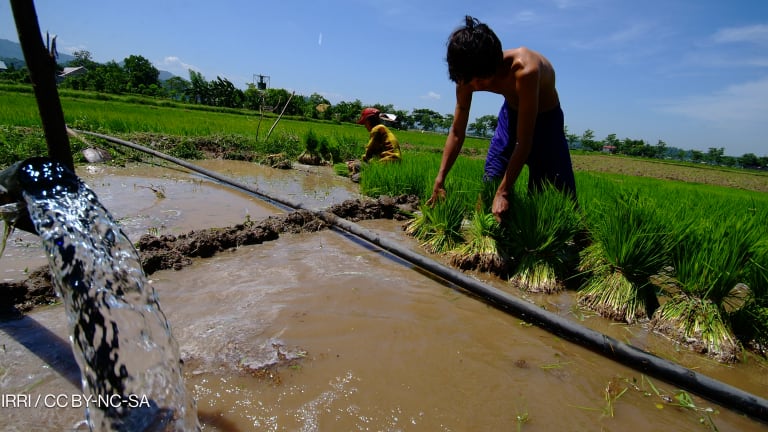
BARCELONA — The Nigerian government must prove it is serious about addressing the country’s water, sanitation, and hygiene challenges before others can be expected to help, says Adebayo Alao, head of water, sanitation, and hygiene service delivery at WaterAid Nigeria.
Nigeria struggled to meet the WASH-related Millennium Development Goal targets, Alao said. Today, only 26.5% of the population has access to improved drinking water sources and sanitation facilities, while 23.5% defecate in the open.
“For development partners, they need to be convinced by the Nigerian government that this time around, they mean business.”
— Adebayo Alao, head of WASH service delivery, WaterAid NigeriaAs we enter the “decade of delivery” for the Sustainable Development Goals, WaterAid says the annual cost for Nigeria to achieve universal access to water and sanitation by 2030 could be as high as $20 billion in capital, operations, and maintenance.
More on WASH:
► Why Nigeria's campaign to end open defecation is failing
► Opinion: Water and sanitation are unexpected life savers for children in war zones
► Full sanitation in rural areas is a century away, warn expert groups
“The chief coordinator, the one who really needs to do the organization to coordinate this process, is the government,” Alao said. “For development partners, they need to be convinced by the Nigerian government that this time around, they mean business. They need to be convinced that investment is going to yield results.”
In 2018, Nigeria’s federal government announced a state of emergency for WASH and launched a National WASH Action Plan.
Speaking to Devex, Alao talked about how such a big funding gap for WASH has come about, how likely the action plan is to work, and what development actors can be doing to boost investment in WASH.
This conversation has been edited for length and clarity.
Why do you think there is such a big funding gap when it comes to WASH in Nigeria?
First of all, funding for WASH — not only in Nigeria, but globally — really is an expensive venture. The infrastructure, construction, and all the components that go along with it are not cheap.
Secondly, in the case of Nigeria, there has been a long period of neglect in infrastructure and provisions in the country. Now that we have the Sustainable Development Goals, which are aimed at revitalizing the setup, the government is waking up and realizing that there's lots to be done. As a result of a long period of neglect, the financing [need] becomes huge.
What do you think can be done to address the funding gaps? Who is the onus on?
The government has the responsibility of creating an enabling environment to ensure that all stakeholders play their role in bridging this gap. The government has the responsibility of first understanding the context and who the key stakeholders are, then coordinating and bringing people together. Other development partners can then key into that. For example, to end open defecation by 2025, we need all hands on deck: the government, the private sector, civil society organizations, and development partners.
What can nongovernmental organizations, donors, and civil society groups do to bring about an increase in investment and an improvement in WASH services to everyone by 2030?
This time around, the Nigerian government is showing their seriousness, and development partners want to see that willingness coming from the government. In the past, the country has not shown much commitment to implementation, but this time around, that has changed and the government is showing they mean serious business. ...
INGOs like WaterAid have signed a memorandum of understanding with the government, aimed at providing support — particularly in areas of technical support, capacity development, and policy and strategy development at [the] state level.
How much of an impact can we expect the National WASH Action Plan to have?
The national plan is just a starting point. It is an aggregation of what needs to be done and is the government saying, 'We are now ready to impact the sector, and we want every stakeholder involved.' But it is one thing to have the plan; it's another thing to really be committed to implementation of that plan. …
The central government is only providing a guideline. It's important that states and local governments develop their own action plans. Commitment comes in two forms: One is the political will to implement the plan you have developed, and the second is the very strong financial piece that you can use to implement the plan.
Is WASH getting the prioritization it needs amid other problems Nigeria currently faces — from a growing population and power outages to rapid urbanization and climate change?
We all understand the primary business of WASH and that it is very central to development generally. For example, WASH has an impact on the education of children, health, infrastructure, and so on. Yes, there are so many other challenges and needs of the country, but WASH is receiving the required attention, particularly at the national level and in some states.
As WaterAid, we support a number of states. We see state governments now increasing their budgetary allocation from what was used to be. There's a much higher amount of WASH intervention in their states. At the moment, we have national momentum supporting the WASH sector.








